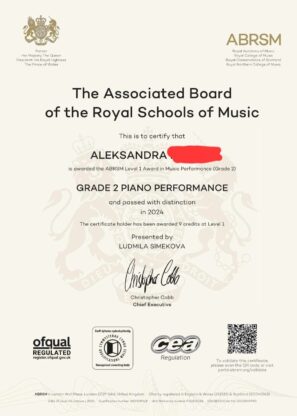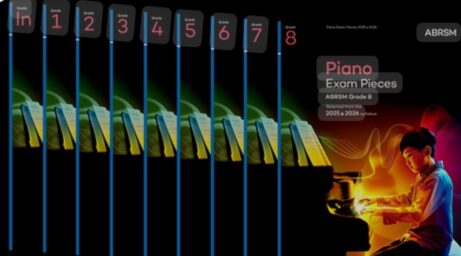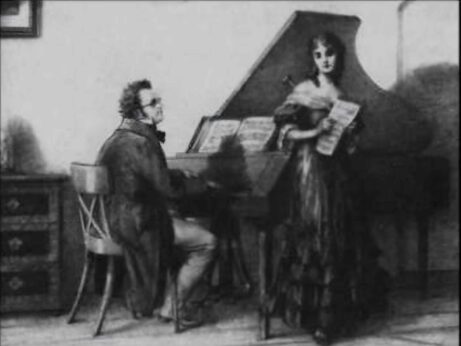ABRSM piano qualification
"Everyone can be 'piano qualified'"
ABRSM exams for classical pianists

The ABRSM (Associated Board of the Royal Schools of Music) is one of the most respected music exam boards for classical pianists. Their structured grading system helps develop well-rounded musicianship through performance, technique, sight-reading, and aural skills.

Each exam consists of four sections:




ABRSM offers 8 graded exams and diploma levels beyond Grade 8.

Basic technical control and musicianship
Simple scales (major & minor) and arpeggios
Sight-reading of easy pieces
Aural tests focus on rhythm, melody, and listening
Bach: Minuet in G
Beethoven: Sonatina in G
Debussy: The Little Shepherd

More complex pieces requiring deeper interpretation
Advanced technical exercises (chromatic scales, contrary motion, etc.)
Challenging sight-reading and aural tests
J.S. Bach: Prelude & Fugue in C Minor
Chopin: Nocturne in E-flat Major
Beethoven: Sonata Op. 10 No. 1

For serious pianists aiming for teaching, performing, or professional careers, ABRSM offers four diploma levels:





Best about ABRSM qualification
Globally Recognized – Valued by music schools and universities (read my story)
Comprehensive Training – Covers technique, performance, and musicianship
Clear Progression – Structured grading system for gradual improvement
Ideal for Classical Pianists – Strong emphasis on traditional repertoire
Would you like advice on preparing for an ABRSM exam? email me on: info@pianowithludmila.com

Why Choose the ABRSM Piano Exam?
The ABRSM (Associated Board of the Royal Schools of Music) is an examination board and registered charity[2] based in the United Kingdom. ABRSM is one of five examination boards accredited by Ofqual to award graded exams and diploma qualifications in music within the UK's National Qualifications Framework (along with the London College of Music, RSL Awards (Rockschool Ltd), Trinity College London, and the Music Teachers' Board). 'The Associated Board of the Royal Schools of Music' was established in 1889[3] and rebranded as ABRSM in 2009.[4] The clarifying strapline "the exam board of the Royal Schools of Music" was introduced in 2012.
More than 600,000 candidates take ABRSM exams each year in over 93 countries. ABRSM also provides a publishing house for music which produces syllabus booklets, sheet music and exam papers and runs professional development courses and seminars for teachers.

How the Piano Qualification Works?
The ABRSM (Associated Board of the Royal Schools of Music) piano examination is a widely recognized music exam for piano students, assessing their technical and musical skills. The exams are structured into eight levels, from Grade 1 (beginner) to Grade 8 (advanced). The exams are designed to evaluate a student’s proficiency in various areas of piano performance, including:
Pieces: Students must perform a selection of pieces from a prescribed list, typically three pieces from different musical styles or periods.
Scales and Arpeggios: Students are tested on their ability to play a variety of scales and arpeggios, often at increasing levels of difficulty.
Sight-reading: This tests a student’s ability to play a piece of music they have not seen before, demonstrating their sight-reading skills.
Aural Skills: This involves listening to and identifying elements of music, such as intervals, rhythms, and chord progressions. It helps assess a student’s musical ear.
The exams are graded on a scale from 1 to 100, with different performance levels required at each grade. After completing Grade 8, students can pursue further qualifications, such as diplomas in music performance or teaching.

Online option
ABRSM exams traditionally have been in-person, but recently, they’ve introduced digital options as well.
In-Person Exam: This is the traditional format, where you attend an exam center and perform in front of an examiner. The exam typically includes playing your pieces, scales, sight-reading, and aural tests.
Digital Exams: ABRSM has also launched a Digital Piano Exam option (called the "Remote Piano Exam"), where you can record your performance at home and submit it online. For this option, you would record your pieces, scales, and other components of the exam and send them to the ABRSM examiners to assess remotely. This option offers more flexibility since you can choose the time and place, but it also requires careful attention to recording guidelines and technology setup.
Do you have more questions? Ask: info@pianowithludmila.com

History of ABRSM
The Associated Board of the Royal Schools of Music (ABRSM) was founded in 1889 in the United Kingdom. Its mission is to set high standards in music education and assessment, offering graded exams and diplomas for students of all ages and levels. Over the years, ABRSM has become one of the most respected music examination boards in the world, recognized internationally for its rigorous and comprehensive approach. Today, ABRSM exams not only test technical skill and musical understanding but also encourage a lifelong love of music.

